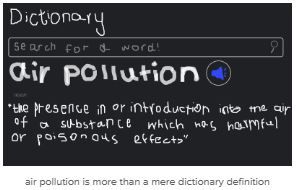Air Pollution: The Ultimate Devastation

Air pollution. It’s a tedious topic, one that we consider boring. However, what if I told you that air pollution is an unfolding story that is literally taking our breath away? Get ready because I’m taking you on a journey into the wild and not-so-wonderful world of air pollution.
The nuts and bolts
Firstly: what is air pollution?
It is the contamination of air due to the presence of substances in the atmosphere. Air pollution is also the greatest environmental threat globally and, along with climate change, has a huge impact on the weather. It’s a large global problem, but it disproportionately affects the most vulnerable among us: women, children, the elderly, and those living in poor, developing nations (most of them in Asia) such as India, Pakistan, and China.
The blame?
Most air pollution is created by humans, and we do it without realizing it. Mundane tasks such as travelling in a vehicle or using an aerosol make our lives so much riskier and even worse for generations to come. And that’s not all: emissions from factories, open burning of wastes, and fossil fuels are all involved in man-made pollution, which are known as anthropogenic sources. However, all fingers can’t be pointed at us because some forms of air pollution, such as smoke from wildfires or ash from volcanoes, occur naturally. These are called natural sources.
Here are a few interesting facts: as I’m typing up these words on my laptop, I’m actually worsening air pollution because electronic devices release harmful gasses into the atmosphere. And if you’re reading these words on an electronic device, then the same goes for you. And for the rest of you who are reading these words on paper, I have a question- are you using an anthropogenic light source (a lightbulb, for example) or natural light? Well, if you said anthropogenic light source… you’re also adding to air pollution.
See what I mean? When you’re so used to something, it’s hard to remember that that thing could have major impacts- not just for you but for your whole world.
Why does it matter?
Our breath is literally being taken away by air pollution: 7 million deaths each year, 9 out of 10 of us breathing polluted air, and every single cell and organ in our body is completely penetrated by tiny, invisible particles. With every breath we take, we suck in nanometer-sized specks that would later damage our lungs, hearts, and brains, causing a host of other health problems- most of them respiratory, meaning that they cause breathing issues.
It doesn't stop there. Air pollution has a lot of potential to increase global warming, especially if it comes in the form of carbon dioxide or methane. The increased heat can also worsen smog: another type of air pollution which reduces visibility. This issue can also break entire ecosystems and fill wildlife with smoke, making plants and animals suffer.
What if we reversed it? And how?
At this point, you may be a bit terrified, BUT, there are lots of ways for an ordinary human like you to play a part in reducing air pollution. Firstly, you can drive less, or take a bike, because vehicle exhaust (a mixture of gasses and particles emitted by a vehicle when its engine runs) is a large cause of air pollution. You could also plant some trees- they absorb carbon dioxide and release as fresh oxygen. Plus, trees play important roles in helping to deal with other types of pollution. A few other solutions to air pollution are to quit aerosol -aerosol pollution alone kills 4.2 million people a year- and to recycle yard trimmings. There is one more great solution which seems like a small thing, but is actually really beneficial- and that’s to turn off electrical sources when they’re not in use, as I already mentioned. It’s important to keep in mind that just like our acts that cause air pollution, the small stuff has huge impacts.
Conclusion
Air pollution might sound like nothing, but it’s an important topic that everyone should take to heart. Remember: anyone can take steps to reduce air pollution. Taking public transportation instead of driving a car, or riding a bike instead of traveling in carbon dioxide-emitting vehicles are just a couple of ways to reduce air pollution. If we work together, we can beat this and construct a better world than there ever has been. There is, unfortunately, no Earth B- so we’ve got to strive to take care of this one.
__________________________________________________________________________________
REFERENCES
Air pollution, in general, and its effects
Some solutions
https://www.pca.state.mn.us/news-and-stories/what-you-can-do-about-air-pollution
Air pollution effects in detail
https://education.nationalgeographic.org/resource/air-pollution/
Why you should care
https://www.cleanairfund.org/news-item/5-reasons-air-pollution-is-everyones-problem/?gclid=CjwKCAjw0N6hBhAUEiwAXab-TVyXX0wGyR6asHEHgAg4QvjR8HvbEz1C7LvfjP0Zdz5Q2WM8rWP04RoCpdoQAvD_BwE
Author Biography
Born in 2010, Insha Ahmed Shifaz is an ordinary 12-year-old sixth grader from the Maldives with interests in MH370, other airplanes, physics, space, and football. She’s in love with books, and her favourite genres are fantasy, crime, and romance. She also likes writing, AI, animals, and random podcasts. Fun fact: her nickname is Tsunami, which was inspired by her birthday and invented by a kid in third grade (credits to you if you were that kid, by the way). Nobody really knows this, so lucky you, you are the wonderful person who is reading this bio. She aims to be a professional traveller when she grows up. Or maybe a pilot. Or an animator. Or a writer

Cite this article as:
Insha Ahmed Shifaz, Air Pollution: The Ultimate Devastation, theCircle Composition, Volume 4, (2023).
